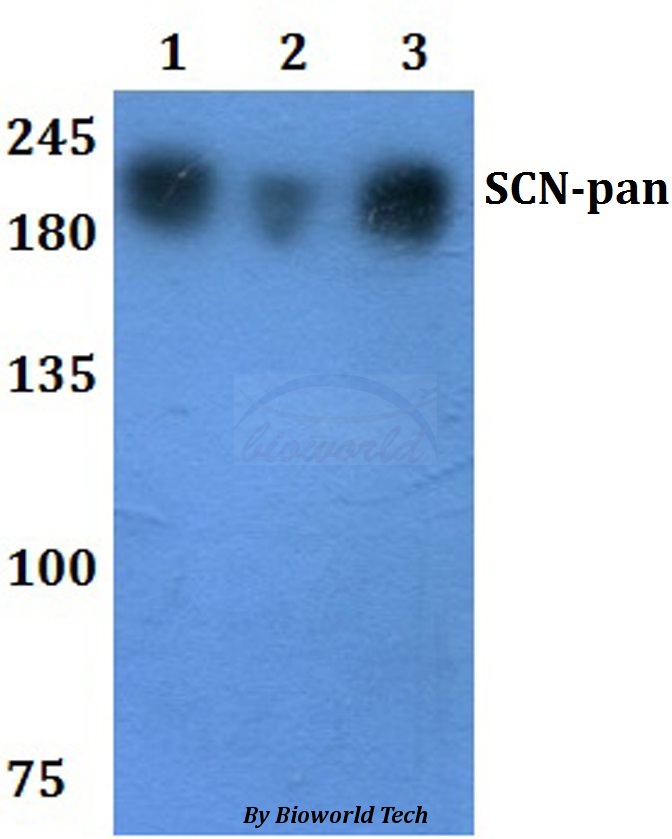Product Name :
SCN-pan polyclonal antibody Background :
Voltage-gated sodium channels are selective ion channels that regulate the permeability of sodium ions in excitable cells. During the propagation of an action potential, sodium channels allow an influx of sodium ions, which rapidly depolarize the cell. The three glycoproteins that comprise the voltage-gated sodium channel proteins include a pore-forming α subunit, a noncovalently associated β1 subunit and a disulfide-linked β2 subunit. The two β subunits regulate the level of channel expression, modulate gating and function as cell adhesion molecules for cellular aggregation and cytoskeleton interaction. The α subunits of sodium channels type I and III are predominantly expressed in neuronal cell bodies and proximal processes, while type IIα subunits are more abundant along axons. The β1 subunit of sodium channel type I is expressed in brain, skeletal and cardiac muscle. In the brain, β1 and β2 are highly expressed in Purkinje cells, and β1 is also expressed in the pyramidal cells of the deep cerebellar nuclei. Impaired voltage-gated sodium channels lead to a number of diseases including myotonia. Product :
Rabbit IgG, 1mg/ml in PBS with 0.02% sodium azide, 50% glycerol, pH7.2 Storage&Stability :
Store at 4°C short term. Aliquot and store at -20°C long term. Avoid freeze-thaw cycles. Specificity :
SCN-pan polyclonal antibody detects endogenous levels of SCN-pan protein. Immunogen :
A synthetic peptide corresponding to residues in Human SCN-pan. Conjugate :
Unconjugated Modification :
Unmodification
SCN-pan polyclonal antibody Background :
Voltage-gated sodium channels are selective ion channels that regulate the permeability of sodium ions in excitable cells. During the propagation of an action potential, sodium channels allow an influx of sodium ions, which rapidly depolarize the cell. The three glycoproteins that comprise the voltage-gated sodium channel proteins include a pore-forming α subunit, a noncovalently associated β1 subunit and a disulfide-linked β2 subunit. The two β subunits regulate the level of channel expression, modulate gating and function as cell adhesion molecules for cellular aggregation and cytoskeleton interaction. The α subunits of sodium channels type I and III are predominantly expressed in neuronal cell bodies and proximal processes, while type IIα subunits are more abundant along axons. The β1 subunit of sodium channel type I is expressed in brain, skeletal and cardiac muscle. In the brain, β1 and β2 are highly expressed in Purkinje cells, and β1 is also expressed in the pyramidal cells of the deep cerebellar nuclei. Impaired voltage-gated sodium channels lead to a number of diseases including myotonia. Product :
Rabbit IgG, 1mg/ml in PBS with 0.02% sodium azide, 50% glycerol, pH7.2 Storage&Stability :
Store at 4°C short term. Aliquot and store at -20°C long term. Avoid freeze-thaw cycles. Specificity :
SCN-pan polyclonal antibody detects endogenous levels of SCN-pan protein. Immunogen :
A synthetic peptide corresponding to residues in Human SCN-pan. Conjugate :
Unconjugated Modification :
Unmodification
-
 Western blot (WB) analysis of SCN-pan polyclonal antibody at 1:500 dilution Lane1:HEK293T whole cell lysate Lane2:RAW264.7 whole cell lysate Lane3:H9C2 whole cell lysate
Western blot (WB) analysis of SCN-pan polyclonal antibody at 1:500 dilution Lane1:HEK293T whole cell lysate Lane2:RAW264.7 whole cell lysate Lane3:H9C2 whole cell lysate
Bioworld Biotech only provide peptides for our antibodies and do not provide additional peptide customization services.
Price/Size :
USD 368/1mg/vial
Tips:
For phospho antibody, we provide phospho peptide(0.5mg) and non-phospho peptide(0.5mg).Describe :
Blocking peptides are peptides that bind specifically to the target antibody and block antibody binding. These peptide usually contains the epitope recognized by the antibody. Antibodies bound to the blocking peptide no longer bind to the epitope on the target protein. This mechanism is useful when non-specific binding is an issue, for example, in Western blotting (WB) and Immunohistochemistry (IHC). By comparing the staining from the blocked antibody versus the antibody alone, one can see which staining is specific; Specific binding will be absent from the western blot or IHC performed with the neutralized antibody.Formula:
Synthetic peptide was lyophilized with 100% acetonitrile and is supplied as a powder. Reconstitute with 0.1 ml DI water for a final concentration of 10 mg/ml.The purity is >90%,tested by HPLC and MS.
Storage:
The freeze-dried powder is more stable. For short time at 2-8°C. For long term storage store at -20°C.
Note :
This product is for research use only (RUO only). Not for use in diagnostic or therapeutic procedures.
 SCN-pan polyclonal antibody
SCN-pan polyclonal antibody  Datasheet
Datasheet COA
COA MSDS
MSDS SHIP
SHIP